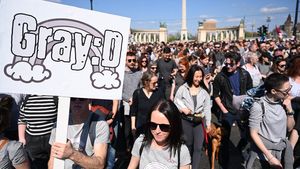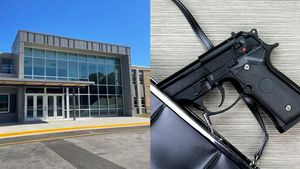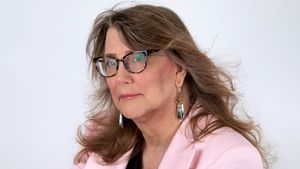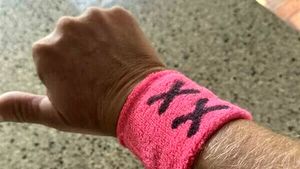Popnography
CONTACTAbout UsCAREER OPPORTUNITIESADVERTISE WITH USPRIVACY POLICYPRIVACY PREFERENCESTERMS OF USELEGAL NOTICE
© 2025 Pride Publishing Inc.
All Rights reserved
All Rights reserved
By continuing to use our site, you agree to our Private Policy and Terms of Use.
The five-time Tony Award winner, Lansbury told the audience that even though she sang "Bosom Buddies" in Mame with Arthur in 1966, it wasn't until the '70s that they became "Bosom Friends."
"Knowing Bea, she wouldn't have approved," Lansbury, dressed in an elegant off-white pantsuit, said about the memorial.
But Billy Goldenberg, Athur's long-time accompanist said, "This is not a memorial; it's a celebration of our delicious time with Bea."
That celebration, open to the public on a first-come, first-serve basis, began outside the Majestic Theater where a lined of Bea-addicts wrapped around 44th street. Celebrity writer and invited guest, Michael Musto, told Out how he thinks Arthur would like to be etched in history.
"I think she'd like to be remembered as a smoldering, withering, slow burn in a caftan," Musto said.
Drag performer and writer Charles Busch arrived with actress Julie Halston and acknowledged Arthur's influence on the drag community.
"She was one of the first celebrity supporters of so many drag performers," said Busch. "She came out of the drudges of humanity to see drag."
Born Bernice Frankel on May 13, 1922 in New York City, but raised in Cambridge Md., Arthur began her career in the late '40s in the theater. In 1964 she landed her first Broadway show, Fiddler on the Roof, playing Yente the Matchmaker. But it wasn't until 1971 when Arthur made a guest appearance on All in the Family as Maude Findlay, an outspoken and liberal feminist, that she became a household name.
Norman Lear, creator of All in the Family and its spinoff Maude (1972-1978), written especially for Arthur, got chocked up when talking about his star at the memorial.
"If I made Bea Arthur laugh 100 times a day, I could not even the score of the depth and grace of how that woman made me laugh," said Lear. "She had me laughing in nooks and crannies of my body in places where I didn't even know existed."
Rosie O' Donnell with John McDaniel at the piano honored Arthur by belting out the theme song for Maude. Before leaving the stage in tears, O' Donnell said, "She really taught me and every other woman my age how to be a feminist at a time when that was a dirty word and without her I think there would not be as many funny women on television today."
Perhaps the biggest laugh of the afternoon came from a story Rue McClanahan shared. During Arthur's one-woman Broadway show in 2002, McClanahan and her husband Morrow Wilson attended a party at Sardi's. Wilson approached Arthur and thanked her for inviting him "and my wife Rue McClanahan."
According to McClanahan, Arthur took one of her famous long pauses, looked at Wilson and said, "I love Rue! Betty [White] is a cunt!"
McClanahan also talked about her friend's softer side, which often remained hidden behind the strong, brassy characters she portrayed.
During Maude's first season McClanahan's mother passed away over the Thanksgiving holiday. Not knowing who to turn to, she called Arthur, who told her to come over to her house. Once she got there, Arthur brought her back to the guest bedroom and made up a bed. Thirty-seven years later, McClanahan still remembers lying there with Arthur at her side.
"I felt for the first time in six days a feeling of peace coming over me. My grief dissipated," McClanahan said. "I guess she had that sort of motherly quality, didn't she?"
Nobody knows that better than Arthur's sons, Daniel and Matthew Saks.
"Two years ago, mom gave me this tuxedo for my birthday," Daniel explained about his choice of attire. "She loved the way I looked in it so much that she made me promise to use any excuse to wear it -- that's my excuse."
Though Arthur leaves behind a legacy of laughter, the LGBT community will always thank her for being a friend. In lieu of flowers at the memorial, donations were accepted to the Ali Forney Center, one of Arthur's favorite charities. The Center provides a safe environment to homeless LGBT youth.
Last month Carl Siciliano, executive director of AFC, announced the Center would name a residence in Arthur's name.
"Before Bea became involved with us, we only had two sites and could only shelter 12 kids." said Siciliano. "We were struggling to respond to an epidemic of homelessness that was not very well understood, even in the LGBT community. Bea's support and advocacy really helped raise awareness in our community."
In typical Dorothy Zbornak fashion, Arthur had the last word before the lights came up on a tear-stained audience. In a video montage, which featured the last scene of the final episode of The Golden Girls, her husky, yet delicate voice sang the song "A Chance to Sing" from her Broadway show:
We're like birds who are perched on the limbs of a tree
When the time is right we simply fly away
That other birds come and take our places
But they won't stay. We come and go. It was always so. And so it will always be.
Before the time when we must fly away
We have the chance to sing ...
To learn more about the Ali Forney Center and the Bea Arthur Residence for LGBT Homeless Youth, visit www.aliforneycenter.org.
-- DUSTIN FITZHARRIS
Previously > Hard Medicine Takes On HIV
From our Sponsors
Most Popular
39 LGBTQ+ celebs you can follow on OnlyFans
November 19 2024 9:39 AM
27 LGBTQ+ reality dating shows & where to watch them
March 24 2025 11:32 AM
21 times male celebrities had to come out as straight
November 19 2024 3:33 PM
17 queens who quit or retired from drag after 'RuPaul's Drag Race'
November 30 2024 12:26 AM
Love is in the air! Unforgettable gay kissing scenes from TV & movies
February 12 2025 3:07 AM
48 steamy celebrity Calvin Klein ads the gays won't forget
March 17 2025 5:42 PM
Murray Bartlett's 8 best gay roles in TV shows & movies
February 12 2025 2:33 PM
29 out & proud LGBTQ+ country artists you should be listening to
April 15 2025 3:21 PM
Maturing is sexy! 11 gay celebs who prove 'twink death' is a total myth
October 21 2024 10:51 AM
Ranking the highest-earning queens in 'RuPaul's Drag Race' herstory
October 25 2024 4:04 PM
Latest Stories
Daring debuts! The first-ever movies by 11 LGBTQ+ filmmakers
April 15 2025 5:53 PM
Here's how to watch Lady Gaga at Coachella & full livestream schedule
April 15 2025 1:49 PM
Laith Ashley dishes on 'very, very gay' Revry series 'Unconventional'
April 14 2025 7:10 PM
Mickey Rourke leaves 'Celebrity Big Brother UK' after 'unacceptable behavior'
April 14 2025 1:49 PM
Need survival tactics? Ask 'The Last of Us' cast
April 13 2025 12:00 PM
Gayle King's facial expression before going to space is the funniest new meme
April 15 2025 5:29 PM
Ian McKellen makes 14-year-old boy's dream come true by starring in his LGBTQ+ film
April 15 2025 12:58 PM
Is Cate Blanchett retiring? Here's what we know
April 15 2025 10:17 AM
The internet reacts to Ellie and Dina's 'The Last of Us' kiss
April 14 2025 4:25 PM
Betty Boop's real-life boyfriend is gay, gorgeous, and spreading joy on Broadway
April 15 2025 12:00 PM
How trans musician Sasha Allen won the heart of America — and Adore Delano
April 14 2025 7:52 PM
New sapphic 'Black Mirror' episode features 'San Junipero' Easter egg
April 14 2025 2:16 PM
Dylan Efron strips down to a towel in skincare routine video
April 14 2025 1:18 PM



















































































